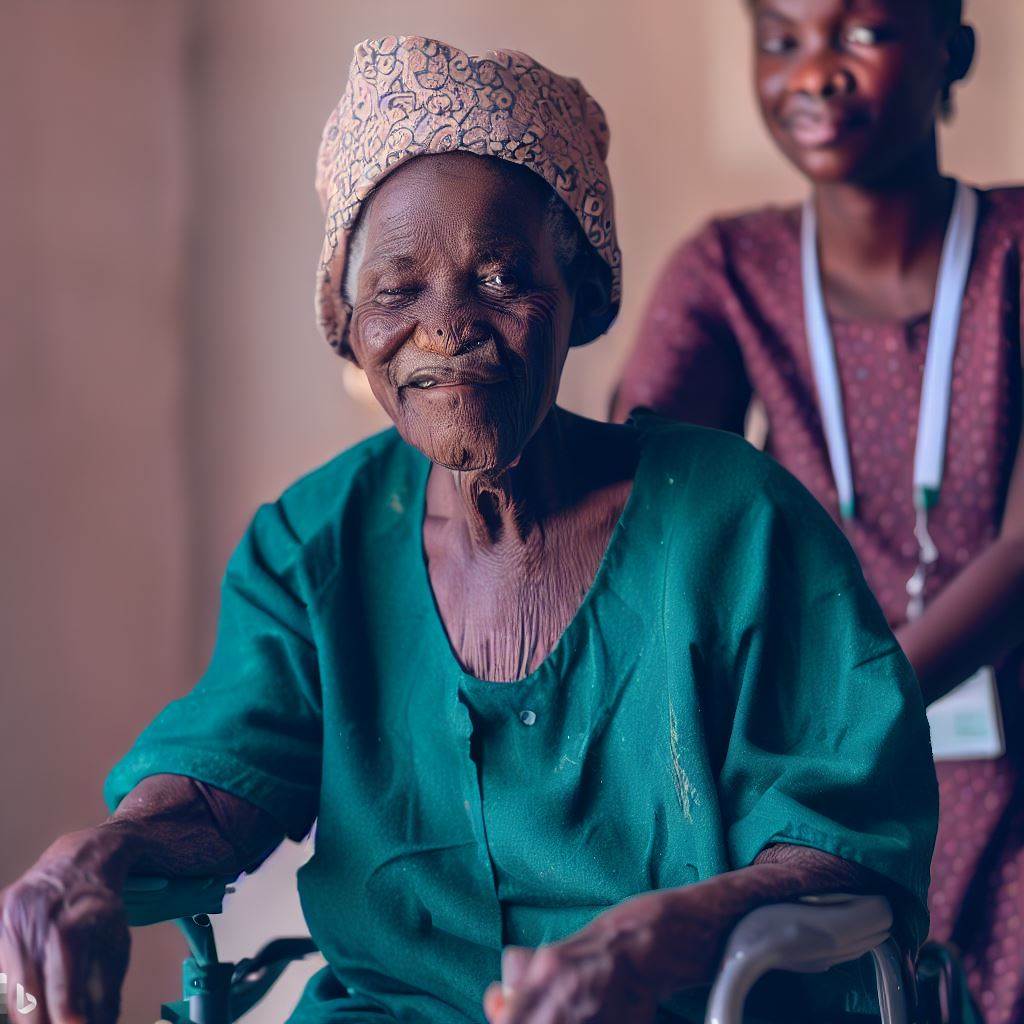Introduction
Background information on Nigeria’s aging population
Nigeria, Africa’s most populous country, is experiencing a notable increase in its aging population.
This demographic shift is mainly attributed to improvements in healthcare, reduced infant mortality rates, and a decline in birth rates.
As a result, the number of older adults, aged 60 and above, is steadily growing in the country.
Definition and role of home health aides
Home health aides (HHAs) play a vital role in supporting the needs and well-being of the elderly population in Nigeria.
These skilled professionals are trained to provide personalized care and assistance to individuals who require help with daily activities, such as bathing, dressing, meal preparation, medication reminders, and general companionship.
HHAs act as a bridge between primary caregivers, healthcare professionals, and the elderly by ensuring that they receive proper care within the comfort of their own homes.
They act as a support system, promoting independence, and enhancing the overall quality of life for the aging population.
In Nigeria, where families often assume caregiving responsibilities, HHAs alleviate the burden by providing essential services that promote the physical and emotional well-being of older adults.
With their compassionate approach and expertise, they offer companionship, assistance with daily tasks, and monitor health conditions.
This support enables seniors to maintain their dignity, improve overall health outcomes, and delay institutional care or hospitalization.
While the demand for home health aides is rapidly increasing, the profession faces challenges such as inadequate training and recruitment.
Consequently, efforts should be made to enhance training programs and create awareness about the importance of HHAs in Nigeria’s aging society.
In fact, as Nigeria’s aging population continues to grow, home health aides play a crucial role in providing essential care and support.
Their presence ensures that older adults can age gracefully, maintain their independence, and enjoy the comfort of their own homes.
The Current State of Nigeria’s Aging Population
Statistics and facts about the aging population in Nigeria
Nigeria’s population is rapidly aging, with an estimated 3.9 million people aged 65 and above. The proportion of elderly Nigerians is expected to double by 2050, reaching 6.7% of the total population.
Life expectancy has significantly increased in Nigeria, from 47 years in 1960 to 54 years in 2020. The aging population in Nigeria is predominantly female, with women making up a higher percentage.
Rural areas in Nigeria have a higher concentration of elderly individuals due to migration patterns.
Challenges and problems faced by the elderly in Nigeria
Limited access to quality healthcare is a major concern for the aging population. Many elderly Nigerians struggle with chronic diseases such as hypertension, diabetes, and arthritis.
Health disparities exist between urban and rural areas, with rural communities facing greater challenges.
Financial constraints often hinder elderly individuals from accessing necessary medical treatments and medications.
Social isolation and loneliness are prevalent among the aging population, leading to mental health issues. Elderly abuse, neglect, and discrimination are serious problems that need urgent attention.
Lack of social support systems and caregiving resources further exacerbate the challenges faced by the elderly.
Limited employment opportunities for the elderly make financial independence difficult to achieve.
Inadequate housing options and accessibility issues prevent the elderly from living independently. The cultural expectation of family care places a burden on adult children, impacting their own lives.
In essence, Nigeria’s aging population is growing at a rapid pace, presenting both opportunities and challenges for the country.
While improvements in healthcare have increased life expectancy, there is a need for better access to quality healthcare services for the elderly.
Additionally, addressing social isolation, financial constraints, and elder abuse are crucial for ensuring the well-being of the aging population.
Recognizing the unique needs of the elderly and implementing policies that promote their health, independence, and dignity are essential steps in managing Nigeria’s aging population effectively.
Home health aides play a vital role in providing care and support to the elderly, helping them maintain a high quality of life in their own homes.
By investing in the training and recruitment of home health aides, Nigeria can meet the needs of its aging population while also creating employment opportunities in this essential sector.
Read: Exploring the Various Nursing Specialties in Nigeria
The Importance of Home Health Aides
Definition and Responsibilities of Home Health Aides
Home health aides are trained professionals who assist elderly individuals with their daily living activities.
They provide personal care, such as bathing, dressing, grooming, and medication reminders. Home health aides also help with housekeeping tasks, meal preparation, and transportation.
They monitor the health and well-being of their clients, reporting any changes or concerns to healthcare professionals.
These aides ensure a safe and comfortable environment for the aging population in Nigeria.
How Home Health Aides Can Support the Aging Population
Home health aides offer companionship, reducing feelings of loneliness and isolation among the elderly. They provide assistance with mobility, helping seniors move around their homes and preventing falls.
These aides help seniors manage chronic conditions, ensuring they take their medications correctly and follow treatment plans.
Home health aides can also provide emotional support and encouragement, promoting mental well-being. They assist with daily tasks, allowing seniors to stay independent and in their own homes for longer.
Benefits of Home Health Aides for the Elderly in Nigeria
Home health aides improve the overall quality of life for elderly individuals by enhancing their physical and mental well-being.
They enable seniors to age in place, avoiding the need for institutionalized care. These aides ensure personalized care that meets the specific needs and preferences of each individual.
Home health aides provide a sense of security and peace of mind for both the elderly and their families. They relieve the burden on family caregivers, allowing them to focus on their own well-being.
In Nigeria’s aging population, home health aides play a crucial role in providing support, care, and assistance to elderly individuals.
These trained professionals assist with daily activities, monitor health, and create a safe and comfortable environment.
Home health aides have defined responsibilities that include personal care, housekeeping tasks, and transportation. They ensure the well-being of seniors, reporting any concerns to healthcare professionals.
By offering companionship and assistance with mobility, they reduce loneliness, prevent falls, and promote independence.
These aides enable seniors to age in place, avoiding institutionalized care. With personalized care tailored to individual needs, they provide a sense of security for both the elderly and their families.
Moreover, home health aides play a vital role in managing chronic conditions. They ensure elderly individuals take their medications correctly and follow treatment plans, promoting physical well-being.
Additionally, they provide emotional support, promoting mental well-being and reducing feelings of isolation.
For families, home health aides relieve the burden on caregivers, allowing them to focus on their own well-being. This support is particularly important as the aging population continues to grow in Nigeria.
Home health aides offer a cost-effective and compassionate solution for elderly individuals who wish to remain in the comfort of their own homes.
In general, home health aides are invaluable in supporting Nigeria’s aging population. Their responsibilities, such as personal care and housekeeping tasks, ensure a safe environment.
These aides provide companionship, assist with mobility, and help manage chronic conditions. The benefits include improved quality of life, aging in place, and peace of mind for both the elderly and their families.
Read: Career Paths for Massage Therapists in Nigeria
Training and Qualifications for Home Health Aides in Nigeria
A vital aspect of the home health aide profession in Nigeria is the proper training and qualifications required to deliver quality care to the aging population.
These requirements and ongoing professional development play a crucial role in ensuring competent and compassionate healthcare providers.
Educational Requirements and Certifications
Home health aides in Nigeria must possess a minimum educational qualification of a secondary school certificate.
Additionally, they should undergo specialized training programs to obtain a certified home health aide status.
These training programs cover various topics such as basic healthcare, personal care, and communication skills.
Certification bodies like the National Association of Home Health Aides provide exams to assess competency.
Successful completion of the exams results in obtaining a certification, enhancing employability.
Skillset and Competencies Needed for Home Health Aides
Home health aides should possess excellent interpersonal and communication skills to build trust with their clients.
They need to be patient, compassionate, and empathetic, as they often work with individuals facing physical or mental challenges.
Basic medical knowledge and the ability to administer medication, under supervision, are crucial skills for home health aides.
They should be proficient in providing personal care, including assistance with bathing, grooming, and mobility.
Observational skills are essential to recognize any changes in the client’s condition and report it to healthcare professionals.
Importance of Continuous Training and Professional Development
In a field as dynamic and unique as home health care, continuous training and professional development are of paramount importance.
As healthcare practices evolve, home health aides need to stay updated with the latest techniques and best practices.
Ongoing training ensures that home health aides have the necessary skills to adapt to changing client needs.
Advancements in technology, such as electronic health records, require aides to receive training on using such systems efficiently.
Continuous professional development contributes to improving the quality of care and client satisfaction.
Regular workshops, seminars, and conferences enable home health aides to network and learn from experienced professionals.
In review, to address the needs of Nigeria’s aging population, home health aides must meet specific training and qualification criteria.
Educational requirements, certifications, and skillsets are essential to provide competent and compassionate care to clients.
Continuous training and professional development further enhance the skillset of home health aides and contribute to better healthcare outcomes.
Read: The Journey of a Massage Therapist: Stories from Nigeria

Challenges and Solutions for Home Health Aides in Nigeria
Lack of awareness and recognition of home health aide profession
Home health aide profession in Nigeria is often overlooked and undervalued. Limited understanding of the vital role home health aides play in supporting the aging population.
Lack of public awareness about the potential career opportunities in the home health aide profession.
Insufficient funding and resources for training and support
Inadequate financial support for the development and implementation of home health aide training programs.
Limited availability of educational resources and tools necessary for comprehensive training. Lack of government funding for ongoing professional development and support for home health aides.
Advocacy and policy recommendations to improve the role of home health aides
Increased advocacy efforts to raise awareness about the value and importance of home health aides. Development of national certification standards to ensure consistent quality of training and competence.
Collaboration with government agencies and healthcare organizations to secure funding for training programs. Integration of home health aides into the formal healthcare system through policy reforms.
Establishment of support networks and professional associations to provide ongoing support and networking opportunities.
Implementation of measures to promote career progression and opportunities for advancement within the profession.
Regular evaluation and assessment of the effectiveness of home health aide programs to identify areas for improvement.
In essence, the role of home health aides in Nigeria’s aging population faces several challenges, including the lack of awareness and recognition of the profession, insufficient funding and resources for training and support, and limited advocacy and policy support.
However, through increased awareness, investment in training and resources, and strategic advocacy efforts, these challenges can be addressed.
By recognizing the importance of home health aides and implementing appropriate policy recommendations, Nigeria can improve the quality of care provided to its aging population and create meaningful career opportunities in the home health aide profession.
Read: Massage Therapy Schools and Certifications in Nigeria
Success Stories and Impact of Home Health Aides in Nigeria
Home health aides play a vital role in Nigeria’s aging population, providing essential care and support to older adults in the comfort of their homes.
Through numerous success stories and the impact they have on healthcare outcomes and quality of life, the significance of these caregivers becomes evident.
Case studies and testimonies from patients and families
Real-life experiences shared by patients and their families shed light on the positive effects of home health aides.
One such story is Mrs. Adebayo, an elderly patient who suffered from multiple chronic conditions.
Before the assistance of a home health aide, she struggled with everyday activities and experienced frequent hospital visits.
However, since receiving dedicated care at home, Mrs. Adebayo has witnessed a significant improvement in her overall well-being.
The home health aide helps her with personal hygiene, medication management, and even accompanies her to medical appointments, ensuring comprehensive care and support.
Similarly, Mr. Okonkwo’s family expresses their gratitude for the presence of a home health aide in his life. Due to age-related mobility issues, Mr. Okonkwo found it challenging to perform basic tasks independently.
With the assistance of a home health aide, he now receives help with bathing, dressing, and meal preparation, among other things.
The family credits the home health aide for enabling Mr. Okonkwo to maintain his dignity and live a more comfortable life, as well as offering them peace of mind knowing that he is well taken care of.
Improvements in healthcare outcomes and quality of life
Home health aides contribute significantly to improving healthcare outcomes and enhancing the quality of life for Nigeria’s aging population.
Studies show a notable decrease in hospital readmissions among elderly patients who receive assistance from home health aides.
By facilitating proper medication management and closely monitoring health conditions, these caregivers help prevent complications and ensure timely interventions, ultimately reducing the need for hospitalization.
Patient testimonies highlight their improved ability to manage chronic conditions with the aid of home health aides.
These caregivers provide valuable assistance in monitoring symptoms, tracking medications, and maintaining healthy lifestyle habits.
Empowered with professional guidance and support, patients experience better control over their health, which leads to enhanced overall well-being and a higher quality of life.
Besides physical health benefits, the presence of home health aides positively impacts the mental and emotional well-being of seniors.
Companionship and social interaction play a vital role in combating loneliness and isolation among the elderly.
Home health aides not only fulfill caregiving responsibilities but also foster meaningful relationships with their clients.
Engaging in conversations, participating in activities, and offering emotional support significantly contribute to a sense of belonging and happiness for seniors.
In the end, the success stories and impact of home health aides in Nigeria’s aging population are evident through the accounts of patients and families.
These caregivers improve healthcare outcomes, reduce hospital readmissions, and enhance the overall quality of life for older adults.
Their valuable assistance and companionship allow seniors to age gracefully in the comfort of their homes, promoting both physical and emotional well-being.
Read: The Path to Becoming a Surgeon in Nigeria
Future Possibilities and Recommendations
Expanding the accessibility and availability of home health aide services
Nigeria needs to develop a comprehensive framework for training and accrediting home health aides. Increased funding should be allocated towards the recruitment and training of home health aides.
Awareness campaigns should be conducted to inform the public about the benefits of home health aide services.
Establishing partnerships with community-based organizations can help in reaching remote areas with home health aide services.
Providing financial assistance and incentives to families who cannot afford home health aide services. Developing a robust infrastructure that allows for easy access to home health aide services in rural areas.
Collaboration with healthcare institutions and organizations
Hospitals, clinics, and nursing homes should collaborate with home health aide agencies to provide integrated care.
Conducting joint training programs for healthcare professionals and home health aides can improve the overall quality of care.
Healthcare institutions can refer patients to home health aide services that meet their specific needs.
Sharing patient information and maintaining effective communication between healthcare providers and home health aides.
Establishing guidelines and protocols for the coordination of care between healthcare institutions and home health aide agencies.
Importance of government support and investment in the sector
The Nigerian government must prioritize the home health aide sector and allocate adequate resources for its development.
Developing policies and regulations that govern the training, licensing, and accreditation of home health aides.
Providing financial incentives and tax breaks to individuals and organizations investing in home health aide services.
Establishing a regulatory body to oversee the quality of home health aide services and enforce standards.
Collaborating with international organizations and governments to learn from best practices in the home health aide sector.
Conducting research to assess the impact and effectiveness of home health aide services in Nigeria’s aging population.
In short, the role of home health aides in Nigeria’s aging population is crucial, and there are several future possibilities and recommendations that can help improve the accessibility and quality of these services.
By expanding the availability of home health aide services, collaborating with healthcare institutions, and receiving government support and investment, Nigeria can ensure that its aging population receives the care and support they need in their own homes.
It is essential to recognize the importance of home health aides and prioritize their role in the healthcare system of Nigeria.
Read: The Journey to Becoming a Registered Nurse in Nigeria
Conclusion
A home health aide plays a crucial role in Nigeria’s aging population by providing essential care and support to older adults in their own homes.
By helping with daily activities, monitoring health, and offering companionship, these aides improve the quality of life for seniors and allow them to age with dignity.
It is imperative for individuals, organizations, and policymakers to prioritize and support home health aide services in Nigeria.
The significance of these professionals cannot be underestimated, and their contributions are vital in addressing the needs of the growing elderly population.
We encourage individuals to consider becoming home health aides, as there is a growing demand for their services.
Organizations should establish programs to train and educate individuals interested in this field, ensuring that there is a sufficient workforce to meet the needs of the aging population.
Policymakers must recognize the importance of home health aide services and implement policies that promote and support their role.
This includes funding initiatives, creating regulations, and establishing standards to ensure the quality and accessibility of care for the elderly.
In summary, home health aides are indispensable in Nigeria’s aging population.
Their significance cannot be overlooked, and it is crucial that we prioritize and provide the necessary support to ensure the well-being of older adults in our society.




